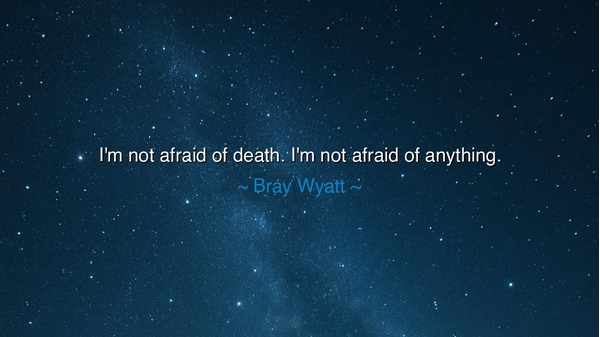
I'm not afraid of death. I'm not afraid of anything.






“I’m not afraid of death. I’m not afraid of anything.” Thus declared Bray Wyatt, the enigmatic warrior of the wrestling world, whose words carried the weight not merely of bravado, but of revelation. In the theatre of combat, where strength and spirit intertwine, Wyatt’s declaration became more than a line of defiance—it became a creed, an anthem of fearlessness that reaches beyond the ring and into the human heart. For what he spoke of was not mere courage in the face of pain or danger, but the transcendence of fear itself—the mastery of the one enemy that chains all souls: the dread of mortality.
In the wisdom of the ancients, such fearlessness was the mark of enlightenment. To conquer death is not to escape it, but to accept it—to understand that it is not an enemy, but a companion walking silently beside us. When Bray Wyatt proclaimed his lack of fear, he was invoking an eternal truth: that the man who no longer trembles before death is free to live fully. The Stoics of Rome, such as Seneca and Marcus Aurelius, taught that to live in harmony with nature was to greet death as calmly as one greets the dusk after a long day’s labor. Death, they said, is but a return to the source, a transformation, not an ending. In Wyatt’s own way—a performer cloaked in the mythic and the mysterious—he echoed that same philosophy: that true power is found in fearlessness, and that fearlessness is born from understanding.
Throughout the ages, men and women who achieved greatness have shared this defiance of fear. Consider the tale of Leonidas, the Spartan king who stood with three hundred warriors at the gates of Thermopylae. Surrounded by the vast armies of Persia, he faced certain death, yet he did not waver. He told his soldiers, “Eat well, for tonight we dine in Hades.” These were not the words of despair, but of acceptance—a recognition that to live with purpose, one must release the terror of the inevitable. In this way, Bray Wyatt’s words echo the spirit of Leonidas: not a denial of mortality, but a declaration that life’s meaning blooms only in the absence of fear.
And yet, to say “I’m not afraid of anything” is not arrogance; it is liberation. It is not the voice of one who knows no pain, but of one who has looked pain in the eyes and refused to bow. In his art, Wyatt often played with darkness—he embodied monsters, demons, and nightmares. But perhaps the secret he was teaching, hidden behind the masks and the fire, was that the darkness itself can be mastered. The warrior who confronts his own shadow becomes invincible. Fear cannot conquer the one who has already walked through the fire of his own doubts. In this, Wyatt joins the company of the mystics and sages, who teach that true peace is found not in avoiding fear, but in walking through it until it fades into light.
In our own age, where anxiety, uncertainty, and doubt plague the hearts of many, these words resound with timeless relevance. To live unafraid is not to live recklessly—it is to live consciously, aware that all things pass, and that even pain and failure are teachers in disguise. The man who fears nothing is not blind to danger; he is simply unmoved by it. He understands that every loss is a lesson, every ending a new beginning. When Bray Wyatt spoke, he gave voice to a truth buried deep within every soul: that courage is not the absence of fear, but the decision to move forward in spite of it.
Let us remember, too, that Wyatt himself faced his battles—within the ring, and beyond it. His career was one of triumph and turmoil, creation and destruction. Yet even in the face of adversity, his message endured: that we must embrace the chaos, for it is through chaos that we find ourselves. His untimely death only deepened the power of his words, for they now stand as a monument to his belief—that the spirit does not die with the body, that fear holds no dominion over the eternal. Thus, his declaration, “I’m not afraid of death, I’m not afraid of anything,” becomes not merely a statement of defiance, but a hymn to immortality—the immortality of the fearless soul.
So, my friends, take from him this lesson: fear is the greatest illusion, and death its mask. Do not flee from the things that frighten you; face them, name them, and watch them lose their power. To live without fear is not to live without care—it is to live with purpose, with love, with unshakable trust in the rhythm of the universe. When you stand before hardship, whisper Wyatt’s words to yourself: “I am not afraid.” And if you believe them, truly and deeply, you will find that nothing—no storm, no sorrow, not even death—can defeat you.
For the one who conquers fear is no longer merely mortal; he becomes like the heroes of old—a being of fire and spirit, whose courage shines beyond his years. And when your own appointed hour comes, may you, too, meet it not with trembling, but with calm defiance, saying, as Bray Wyatt once did, with the voice of one who has already conquered the darkness: “I’m not afraid of death. I’m not afraid of anything.”






AAdministratorAdministrator
Welcome, honored guests. Please leave a comment, we will respond soon